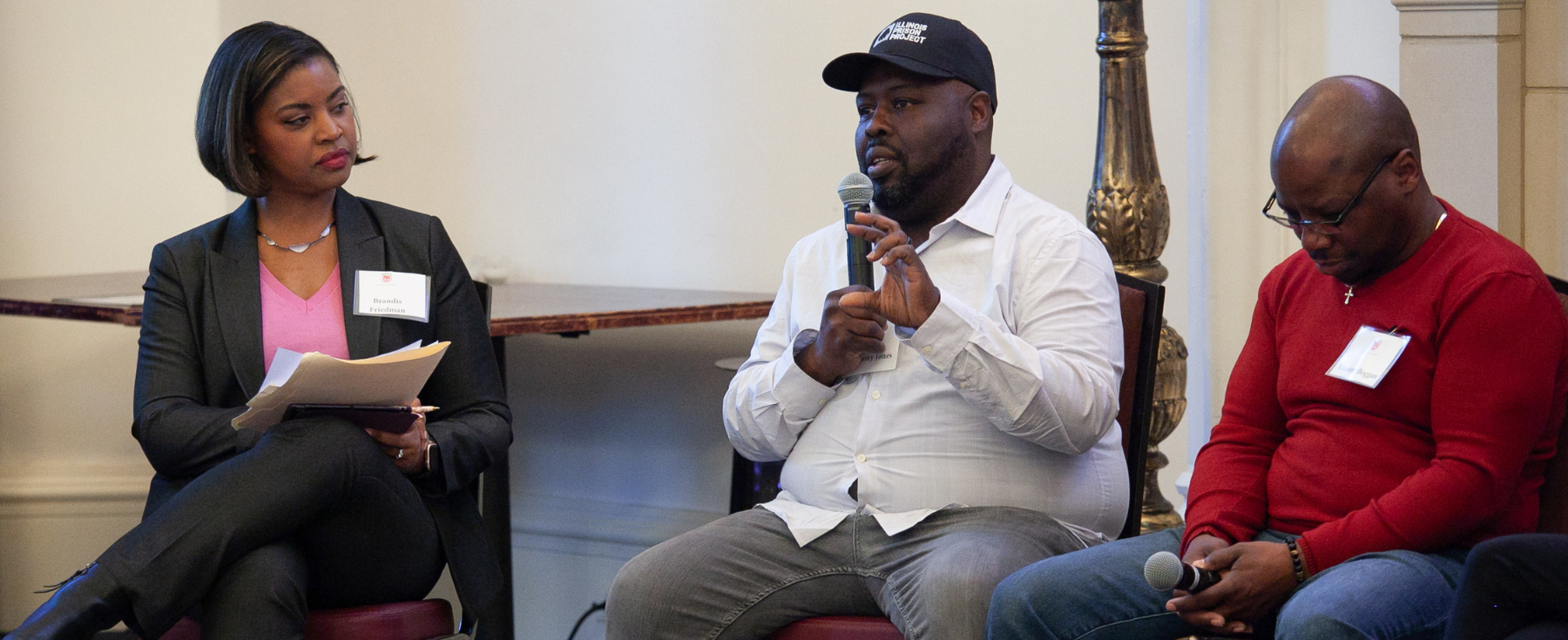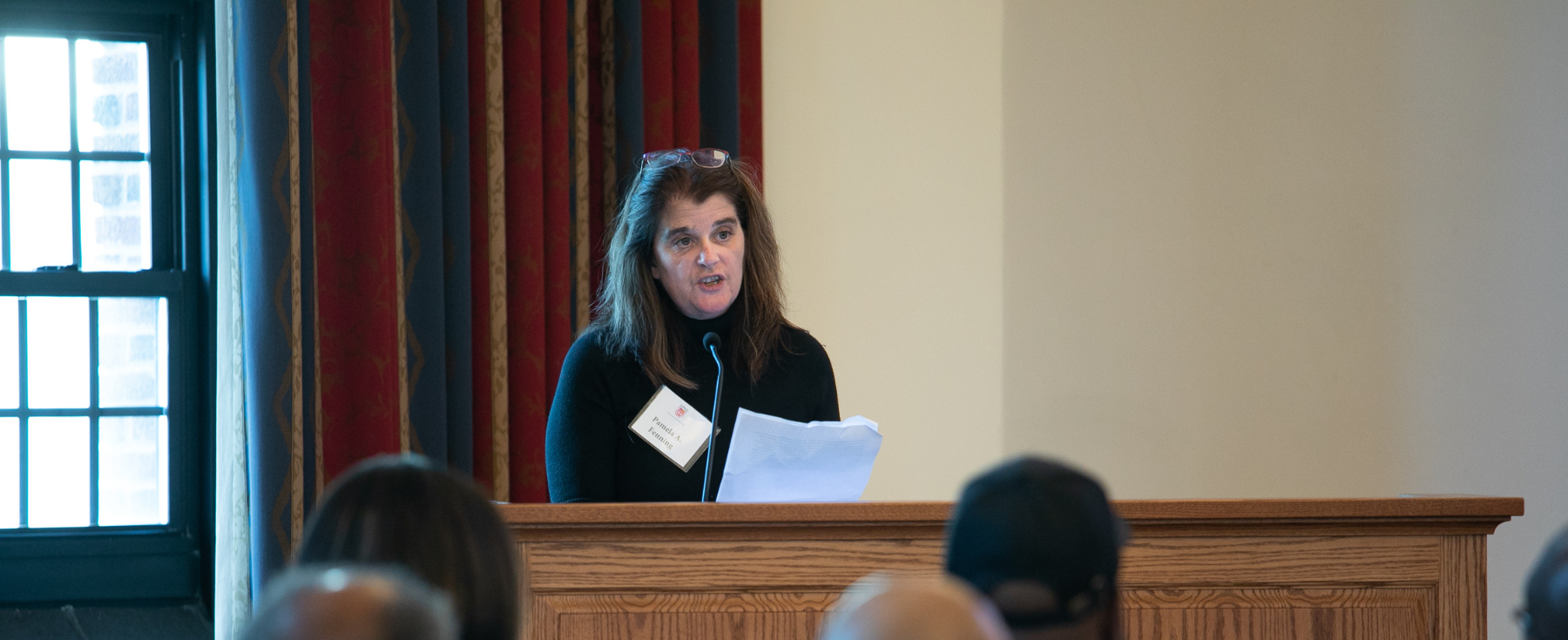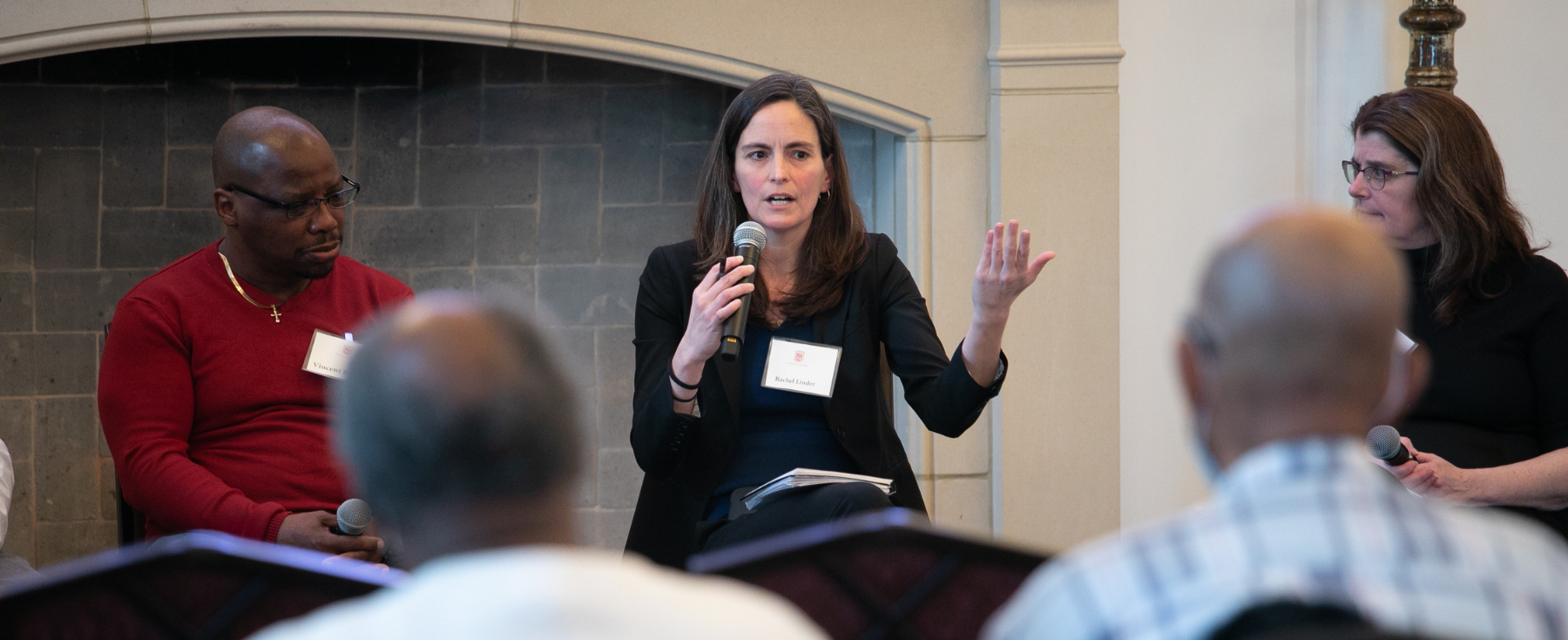From Passion to Progress
In today’s world, it has become far too easy for punishment to reign supreme in times when individuals could reap greater benefits from a gentler nudge in the right direction. Where harm is done–either within schools or the prison system–Loyola School of Education’s School Discipline Reform Program and the Illinois Prison Project each utilize restorative justice in place of enforcing harsh or exclusionary punishment.
Restorative justice in practice focuses on repairing harm and rebuilding the affected relationships as a form of conflict resolution. A restorative approach focuses on addressing the problems at hand and finding constructive techniques to work through them.
Loyola School of Education partnered with the Illinois Prison Project to host From Passion to Progress, an event that aims to shed light on the idea of reimagining prison reform to create systemic, interdisciplinary change. The event highlighted just how important restorative justice is in today’s world.

School of Education Associate Dean for Research and Professor Dr. Pamela Fenning co-founded Loyola’s School Discipline Reform program with her colleague at the School of Law, Miranda Johnson. The two saw the dire need for this interdisciplinary program as a way to combat exclusionary discipline that disproportionately target historically marginalized students and to bring forth a kind of justice that supports our vulnerable students.
The School Discipline Reform program consists of an online certificate designed to teach education professionals the necessary skills needed to lead comprehensive initiatives that reduce suspensions, expulsions, and their negative impacts on vulnerable students. The certificate consists of four two-credit courses, a required anti-racism workshop, and a required immersion seminar focused on restorative justice in schools.
Fenning and Johnson developed the program with an understanding of the importance of forming relationships with students and truly caring about each child’s well-being. “Restorative practice is this idea that we’re wanting to form very positive relationships with our students,” says Fenning. “What do you do to restore harm versus thinking about our traditional reactions to suspend the student or expel the student? That harms the relationship and gets the students out of school,” says Fenning.
“It’s a complex issue that does not have simple solutions.” Dr. Pamela Fenning, Professor, Co-Program Chair for School Psychology
Caring for students and understanding their backgrounds and personal experiences opens doors to productive, beneficial approaches to conflict management. “Just like we would teach academics–if a student doesn’t know algebra, we directly teach it. If we see behavior and discipline issues, we’re very quick to remove that student, and they may not understand the expectations,” says Fenning. “It’s a complex issue that does not have simple solutions.”

Reverend Dr. Robert Spicer teaches the School Discipline Reform program’s Restorative Justice in Schools course. Spicer has dedicated his career to transforming a once zero-tolerance education system into one that prioritizes fairness and allows students to learn from their mistakes.
Spicer discovered his passion for revitalizing communities after spending September 11, 2001, amongst his elementary class in Chicago, Illinois as his family was unreachable in New York City, New York. His young students showed him the utmost kindness and understanding amid a national tragedy. Spicer credits this experience as what opened his eyes to a new way of connecting and developing mutual respect with students. “If not for those children, I would not have an awareness that there is a better way," says Spicer.
This shift toward healing and reconciliation is vital to the continued success and well-being of the nation. REVEREND DR. ROBERT SPICER
Since 2001, Spicer has led an accomplished career; along with teaching, he has done consulting work and even advised the Obama Administration in 2015 to emphasize the importance of reparatory practices in education throughout America. "My work as a practitioner of restorative justice in schools, and as a professor, is to bring awareness and fall within the lines of the work that we’re doing with the School of Education–to create socially conscious principals, deans, and teachers from all walks of life that can come into our class, take this work, and begin to bring reconciliation and healing into the school systems," says Spicer.

Through peacemaking circles, victim-offender mediations, family group conferencing, peer juries, and more, Spicer has seen the benefits of restoration. He recognizes this shift toward healing and reconciliation as being vital to the continued success and well-being of the nation. “The working definition that I like to use with restorative justice is justice that heals. Learn from your mistakes, and use these moments to get better and not bitter,” says Spicer.
The Illinois Prison Project–an Illinois-based nonprofit that fights against regressive policies, racist practices, and a system that treats people as disposable–embodies this idea of using justice to heal. The organization roots itself in four core principles that outline its commitment to improving Illinois’ prison system: no one is their worst act, no one is beyond mercy or redemption, our criminal legal system is rooted in racism, and everyone’s voice matters.
"Learn from your mistakes, and use these moments to get better and not bitter.” Reverend Dr. Robert Spicer
Kaitlyn Foust, Loyola University Chicago alumna and Assistant Director of Education at the Illinois Prison Project, understands restorative justice as a means of emphasizing strong relationships and open communication.
“Restorative practices really emphasize the why and how of a situation,” says Foust. In times where focus may initially be on what is being done and who must do it, restorative practices dive deeper into the situation to evaluate why and how to do something most beneficially. “It can be difficult to navigate these things sometimes because we’re so ingrained in the what and the who. Really what it comes down to is changing the way we do these things,” says Foust.
As Foust explains best, using a restorative lens to make things right instead of punish is one of the major ways to improve not only the Illinois prison system but also the future. In our schools and our prison systems, we must strive to look holistically at discipline, recognize the importance of the why and how in all situations, and use justice to heal.
Story by Kate Roudebush
In today’s world, it has become far too easy for punishment to reign supreme in times when individuals could reap greater benefits from a gentler nudge in the right direction. Where harm is done–either within schools or the prison system–Loyola School of Education’s School Discipline Reform Program and the Illinois Prison Project each utilize restorative justice in place of enforcing harsh or exclusionary punishment.
Restorative justice in practice focuses on repairing harm and rebuilding the affected relationships as a form of conflict resolution. A restorative approach focuses on addressing the problems at hand and finding constructive techniques to work through them.
Loyola School of Education partnered with the Illinois Prison Project to host From Passion to Progress, an event that aims to shed light on the idea of reimagining prison reform to create systemic, interdisciplinary change. The event highlighted just how important restorative justice is in today’s world.
School of Education Associate Dean for Research and Professor Dr. Pamela Fenning co-founded Loyola’s School Discipline Reform program with her colleague at the School of Law, Miranda Johnson. The two saw the dire need for this interdisciplinary program as a way to combat exclusionary discipline that disproportionately target historically marginalized students and to bring forth a kind of justice that supports our vulnerable students.
The School Discipline Reform program consists of an online certificate designed to teach education professionals the necessary skills needed to lead comprehensive initiatives that reduce suspensions, expulsions, and their negative impacts on vulnerable students. The certificate consists of four two-credit courses, a required anti-racism workshop, and a required immersion seminar focused on restorative justice in schools.
Fenning and Johnson developed the program with an understanding of the importance of forming relationships with students and truly caring about each child’s well-being. “Restorative practice is this idea that we’re wanting to form very positive relationships with our students,” says Fenning. “What do you do to restore harm versus thinking about our traditional reactions to suspend the student or expel the student? That harms the relationship and gets the students out of school,” says Fenning.
Caring for students and understanding their backgrounds and personal experiences opens doors to productive, beneficial approaches to conflict management. “Just like we would teach academics–if a student doesn’t know algebra, we directly teach it. If we see behavior and discipline issues, we’re very quick to remove that student, and they may not understand the expectations,” says Fenning. “It’s a complex issue that does not have simple solutions.”
Reverend Dr. Robert Spicer teaches the School Discipline Reform program’s Restorative Justice in Schools course. Spicer has dedicated his career to transforming a once zero-tolerance education system into one that prioritizes fairness and allows students to learn from their mistakes.
Spicer discovered his passion for revitalizing communities after spending September 11, 2001, amongst his elementary class in Chicago, Illinois as his family was unreachable in New York City, New York. His young students showed him the utmost kindness and understanding amid a national tragedy. Spicer credits this experience as what opened his eyes to a new way of connecting and developing mutual respect with students. “If not for those children, I would not have an awareness that there is a better way," says Spicer.
Since 2001, Spicer has led an accomplished career; along with teaching, he has done consulting work and even advised the Obama Administration in 2015 to emphasize the importance of reparatory practices in education throughout America. "My work as a practitioner of restorative justice in schools, and as a professor, is to bring awareness and fall within the lines of the work that we’re doing with the School of Education–to create socially conscious principals, deans, and teachers from all walks of life that can come into our class, take this work, and begin to bring reconciliation and healing into the school systems," says Spicer.
Through peacemaking circles, victim-offender mediations, family group conferencing, peer juries, and more, Spicer has seen the benefits of restoration. He recognizes this shift toward healing and reconciliation as being vital to the continued success and well-being of the nation. “The working definition that I like to use with restorative justice is justice that heals. Learn from your mistakes, and use these moments to get better and not bitter,” says Spicer.
The Illinois Prison Project–an Illinois-based nonprofit that fights against regressive policies, racist practices, and a system that treats people as disposable–embodies this idea of using justice to heal. The organization roots itself in four core principles that outline its commitment to improving Illinois’ prison system: no one is their worst act, no one is beyond mercy or redemption, our criminal legal system is rooted in racism, and everyone’s voice matters.
Kaitlyn Foust, Loyola University Chicago alumna and Assistant Director of Education at the Illinois Prison Project, understands restorative justice as a means of emphasizing strong relationships and open communication.
“Restorative practices really emphasize the why and how of a situation,” says Foust. In times where focus may initially be on what is being done and who must do it, restorative practices dive deeper into the situation to evaluate why and how to do something most beneficially. “It can be difficult to navigate these things sometimes because we’re so ingrained in the what and the who. Really what it comes down to is changing the way we do these things,” says Foust.
As Foust explains best, using a restorative lens to make things right instead of punish is one of the major ways to improve not only the Illinois prison system but also the future. In our schools and our prison systems, we must strive to look holistically at discipline, recognize the importance of the why and how in all situations, and use justice to heal.

.png)